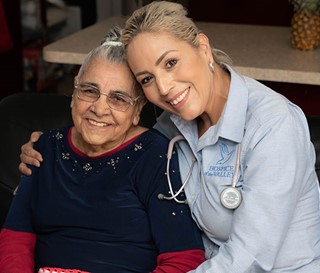Hospice of the Valley celebrates Hispanic heritage

Bilingual nurses provide culturally sensitive care to Spanish-speaking families in our community.
Gilbert Sun News
Sept. 13, 2020
by Lin Sue Cooney
While Hispanic Heritage Month is traditionally celebrated Sept. 15-Oct. 30, it’s a year-round priority for many community agencies, including Hospice of the Valley.
During this pandemic, when so many are isolated and anxious, it’s more critical than ever that those on an end-of-life journey are not traveling it alone.
Many Hispanic families are still culturally conditioned to view hospice as a “place,” instead of a philosophy of care.
In their native Mexico, hospice meant leaving home and family to die among strangers. In this country, hospice care means the opposite – clinical teams come to your home to offer care and support.
“It’s our goal, each and every day, to educate the Hispanic community that this beautiful care exists to help support family members and keep families together,” says Hospice of the Valley nurse Erica Coronado.
“There are so many false assumptions – and it’s hard for them to believe that we care for everyone, regardless of whether they have insurance.”
Dispelling misconceptions is what Hospice of the Valley community liaison Suzanne Sanchez does every month on her radio show, “Brindando Comunidad con Dignidad,” on Spanish-language station La Onda.
She invites colleagues – social workers, nurses, chaplains and volunteers – to talk about the many programs and resources the nonprofit agency offers the Hispanic community.
“We work together to break down cultural and language barriers about hospice,” she says. “We want to make sure people are aware of all that is available to them – especially those who do not have consistent healthcare.”
Across the Valley, Hispanic families can see special billboards featuring Spanish-speaking patients and their bilingual care teams.
One depicts three generations of the Dominguez family – Isidora is the proud matriarch who is grateful that her daughters took the time to understand the concept of hospice care.
“Hospice of the Valley is help, trust and hope,” Isidora’s daughter, Gladis, says. “It’s important that we share that message with other Hispanic families.”
She hopes more people will get the support they need and understand firsthand what “un legado para el cuidado” – a legacy of caring – means.
Spanish-speaking chaplains offer comfort at the bedside – these days in masks and from a safe distance – but it’s not just patients who need reassurance.
Family members struggling with worries about the coronavirus must feel supported, too.
“People need kindness and understanding more than ever right now,” says chaplain Cristiano Artigas. “They aren’t spending time with friends, co-workers or extended family and they desperately need a listening ear and sympathetic heart.”
One of the biggest obstacles is language. Spanish-speaking families need to feel comfortable reaching out for help in their native tongue.
That’s why Spanish-speaking staff are available — in person or over the phone; any time of day or night, seven days a week.
Hospice of the Valley has the only grief support program designed specifically for Spanish-speaking youngsters – and it is offered at no charge.
The group, Luz del Corazon, helps children and teens feel safe so they can clearly express themselves and move toward healing.
“Everybody wants the best care, love and respect. That’s universal. That’s why it’s so important to be able to communicate with my patients in Spanish,” says Giancarlo Fratiglioni, an after-hours nurse for Hospice of the Valley.
“There is always something that gets confused, missed or misunderstood when you translate from English to Spanish. We don’t take that chance.”
The Venezuelan native loves all his patients, but there’s one he can’t wait to see every Thursday: 94-year-old Esperaza Borboa.
That’s because the Guadalupe resident always sings to him in Spanish – musica ranchera and boleros – as her son Johnny strums the guitar. Johnny even created a YouTube channel (“Maez Vega”) that has over 350 videos of them singing their hearts out.
“It makes me look forward to the day just to come here and see her,” Giancarlo says while he visits Esperaza in her home. “Her positive energy is contagious. It makes you feel good, it makes you feel happy! It’s good for the soul!”
To learn more about Hospice of the Valley’s bicultural care, visit hov.org or call 602-530-6900. For information on Spanish-language grief support, call 480-951-8985. For career opportunities, visit hov.org/careers; Spanish skills are a plus.
